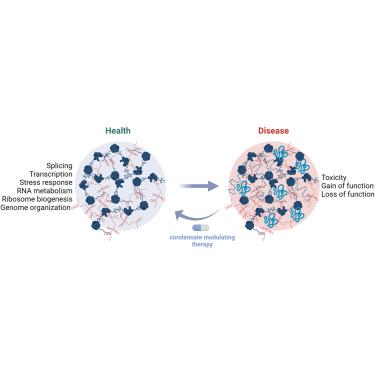Cell Chemical Biology ( IF 6.6 ) Pub Date : 2024-09-19 , DOI: 10.1016/j.chembiol.2024.08.009 Tina W. Han , Bede Portz , Richard A. Young , Ann Boija , Isaac A. Klein

|
Biomolecular condensates are dynamic membraneless organelles that compartmentalize proteins and RNA molecules to regulate key cellular processes. Diverse RNA species exert their effects on the cell by their roles in condensate formation and function. RNA abnormalities such as overexpression, modification, and mislocalization can lead to pathological condensate behaviors that drive various diseases, including cancer, neurological disorders, and infections. Here, we review RNA’s role in condensate biology, describe the mechanisms of RNA-induced condensate dysregulation, note the implications for disease pathogenesis, and discuss novel therapeutic strategies. Emerging approaches to targeting RNA within condensates, including small molecules and RNA-based therapies that leverage the unique properties of condensates, may revolutionize treatment for complex diseases.
中文翻译:

RNA 和凝聚物:疾病影响和治疗机会
生物分子凝聚物是动态无膜细胞器,可分隔蛋白质和 RNA 分子以调节关键的细胞过程。不同的 RNA 种类通过它们在凝聚体形成和功能中的作用来对细胞产生影响。 RNA 异常(例如过度表达、修饰和错误定位)可能导致病理性凝聚行为,从而导致各种疾病,包括癌症、神经系统疾病和感染。在这里,我们回顾了 RNA 在凝聚态生物学中的作用,描述了 RNA 诱导的凝聚态失调的机制,指出了其对疾病发病机制的影响,并讨论了新的治疗策略。靶向凝结物中 RNA 的新兴方法,包括利用凝结物独特性质的小分子和基于 RNA 的疗法,可能会彻底改变复杂疾病的治疗。






























 京公网安备 11010802027423号
京公网安备 11010802027423号